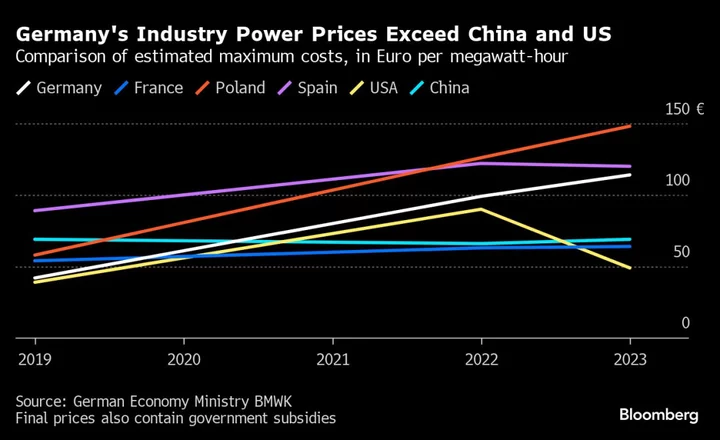The German government agreed on measures to ease electricity bills for manufacturers over the next five years in an attempt to boost the economy.
The support package is set to provide relief worth up to €12 billion ($12.8 billion) in 2024, Chancellor Olaf Scholz said in a statement. The measures include a substantial reduction in electricity taxes for manufacturers, which is closer to the rates in other European countries — from €15.37 to €0.50 per megawatt-hour — as well as additional support for particularly energy-intensive firms.
German chemical stocks soared in reaction to the agreement.
The country’s manufacturing-heavy economy has seen a protracted period of weakness that shows few signs of abating amid plunging business confidence. It’s the only G-7 member predicted by the IMF to contract in 2023 and high energy costs have been one of the main drags on activity.
While the nation’s electricity prices have moderated from last year’s peaks, they’re expected to remain elevated until at least 2027. That’s when a significant amount of capacity from offshore wind is expected to come online, which could help reduce electricity prices for large industries.
“It’s important that we have found a way to support the competitiveness of industry,” Economy Minister Robert Habeck said. “Very energy-intensive companies can achieve an electricity price of less than 6 cents from 2025 through the interaction of the instruments.”
6 cents per kilowatt-hour was the initial price tag Habeck pushed for earlier this year when the coalition began negotiating the scope of further support for industry. However, his plan was only targeted at energy-intensive manufacturers and was estimated to cost up to €30 billion until 2030.
The agreement on the package ended months of in-fighting within Germany’s ruling coalition. Finance minister Christian Lindner — who pushed for relief for the broader manufacturing sector — said the tax reduction now agreed on could be funded from the regular budget and will allow the country to adhere to its constitutional debt brake.
Habeck’s industry power price also may have faced skepticism from the European Commission, which typically has to approve any new state aid within its member states. Since the coalition’s measures tweak existing policy tools, they don’t need to be reported to Brussels’ competition watchdogs.
The German Chamber of Commerce and Industry welcomed the package as an “important signal for extremely electricity-intensive sectors” but warned that companies in trade and services also depend on affordable power prices. “This makes it all the more urgent to reduce prices by rapidly expanding the supply of electricity,” the group’s president Peter Adrian said in a statement.
Scholz’ Social Democrats said the coalition will continue to work toward that aim in the coming years through the expansion of renewable energy and other measures, according to co-leader Lars Klingbeil.
--With assistance from Rachel Morison and Isolde MacDonogh.
(Updates with stock market, industry reactions and more details throughout.)

